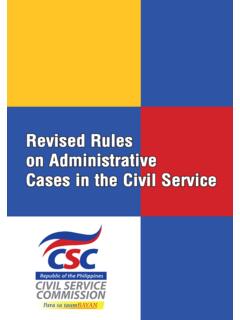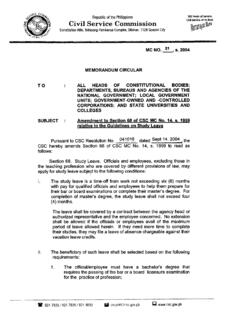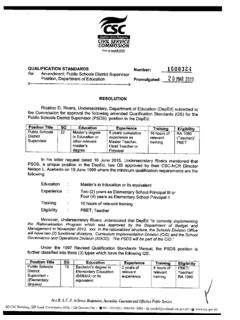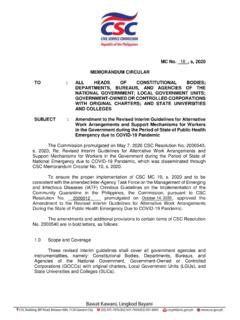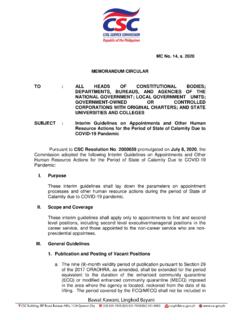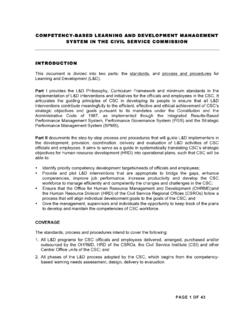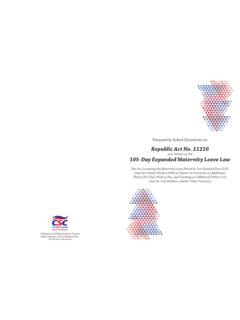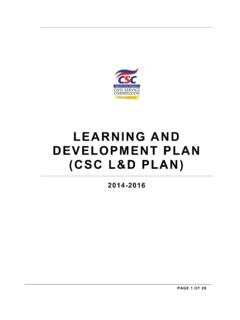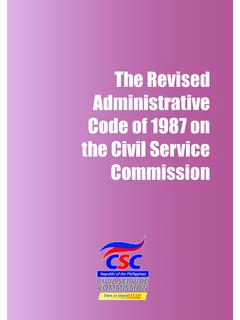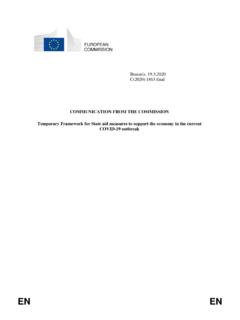Transcription of Republic of the Philippines Civil Service Commission ...
1 Republic of the Philippines Civil Service Commission Department of Health Department of Labor and Employment JOINT MEMORANDUM CIRCULAR NO. 1, s. 2020 TO : HEADS OF CONSTITUTIONAL BODIES, DEPARTMENTS, BUREAUS AND AGENCIES OF THE NATIONAL GOVERNMENT, LOCAL GOVERNMENT UNITS, GOVERNMENT-OWNED AND/OR CONTROLLED CORPORATIONS WITH ORIGINAL CHARTERS AND STATE UNIVERSITIES AND COLLEGES SUBJECT : OCCUPATIONAL SAFETY AND HEALTH (OSH) STANDARDS FOR THE PUBLIC SECTOR WHEREAS, Section 15, article II of the Philippine Constitution of 1987 provides that the State shall protect and promote the right to health of the people and instill health consciousness among them.
2 article XIII, Section 3 provides further that the State shall afford full protection to labor, local and overseas, organized and unorganized, and promote full employment and equality of employment opportunities for all. WHEREAS, Paragraph 2, Section 3, article XIII of the 1987 Constitution guarantees the rights of all workers to a decent and humane conditions of work. WHEREAS, Section 18, article II of the 1987 Constitution provides that the State affirms labor as a primary social economic force. It shall protect the rights of workers and promote their welfare. WHEREAS, Section 3, article IX-B of the 1987 Constitution provides that the Civil Service Commission (CSC), as the central personnel agency of the bureaucracy shall adopt measures to promote morale, efficiency, integrity, responsiveness and courtesy in government.
3 WHEREAS, Item 3, Section 12, Chapter 3 Book V Title 1, Subtitle A of Executive Order No. 292 (Administrative Code of 1987), mandates the CSC to promulgate policies, standards and guidelines for the Civil Service and adopt plans and programs to promote economical, efficient and effective personnel administration in the government; WHEREAS, the CSC recognizes the importance of providing healthy and safe work environment for the government workforce, thus, it promulgated Memorandum Circular No. 38, s. 1992 dated September 30, 1992 (Physical and Mental Fitness Program for Government Employees); Memorandum Circular No.
4 30, s. 1994 dated September 8, 1994 (Checklist 2 of Reasonable Working Conditions in the Public Sector); Memorandum Circular No. 33 dated December 22, 1997 (Policy on Working Conditions in the Workplace) ; and many other related policy issuances; WHEREAS, PD 442 or the Labor Code of the Philippines ; Book IV, Title II set the standards for Occupational Safety and Health in different industries, as well as measure for the prevention and control of occupational hazards. Accordingly, the Bureau of Working Conditions-Department of Labor and Employment (BWC-DOLE) promulgated rules pertaining to Occupational Safety and Health (OSH) such as Rule 1060 (Premises of Establishments); Rule 1070 (Occupational Health and Environmental Control); Rule 1080 (Personal Protective Equipment and Devices); Rule 1090 (Hazardous Materials) and DOLE Department Order No.
5 136-14 dated February 28, 2014 (Guidelines for the Implementation of Globally Harmonized System [GHS] in Chemical Safety Program in the Workplace); Rule 1030 (Training of Personnel in Occupational Safety and Health) as amended by DOLE Department Order No. 16 series of 2001; Rule 1040 (Health and Safety Committee); and Rule 1050 (Notification and Keeping of Records of Accidents and /or Occupational Illnesses). These rules provide specific OSH-related standards for the workers in general. WHEREAS, Executive Order No. 102 series of 1999 dated May 24, 1999 mandates the Department of Health to promote the well-being of every Filipino; prevent and control diseases among populations at risks; protect individuals, families and communities exposed to hazards and risks that could affect their health; and treat, manage and rehabilitate individuals affected by disease and disability.
6 WHEREAS, under PD 856 or the Code on Sanitation of the Philippines (Chapters 6 & 7), school sanitation and industrial hygiene services should be directed towards the protection and promotion of workers health. WHEREAS, considering the continuing influx of changes in the working environment brought about by industrialization, globalization, and technological advancement affecting health and wellness of government workers in the workplace, there is a need to enhance and to further improve the existing working conditions in all government agencies. WHEREAS, on January 31, 2017, the CSC, DOH and DOLE issued the Joint Administrative Order on the National Occupational Health and Safety Policy Framework (JAO No.)
7 2017-001) to guide the key stakeholders in the development, implementation, monitoring and evaluation of Occupational Safety and Health for both the public and private sector workers. WHEREAS, the Civil Service Commission (CSC), Department of Health (DOH) and the Department of Labor and Employment (DOLE) recognize the need for all government agencies to establish a set of Occupational Safety and Health (OSH) Standards to protect all government employees from the hazards of injury, sickness or death through the adoption of safe and healthy working conditions to assure the conservation of human life and the prevention of loss of resources and damage to properties.
8 3 WHEREAS, OSH Standards for the Public Sector must be strictly complied with, implemented, diligently monitored, and evaluated to facilitate future policy innovations and/or initiatives. NOW, THEREFORE, the CSC, DOH and DOLE hereby enjoin all concerned to comply with the Guidelines on Occupational Safety and Health Standards for the Public Sector, as follows: GUIDELINES ON OCCUPATIONAL SAFETY AND HEALTH STANDARDS FOR THE PUBLIC SECTOR I. Rationale Global trade liberalization, rapid technological progress, shifting patterns of employment to include migration, changes in organization s work practices, such as business process outsourcing, and the size, structure and life cycles of enterprises can all generate new types and patterns of hazards, exposures and risks.
9 For the year 2011, the Philippines Labor Statistics reported 48,977 occupational injuries; mostly occurring in the manufacturing, wholesale and retail trade, accommodation and food Service , construction and agriculture industries. Further, an estimated 85,843 cases of occupational diseases were also reported in establishments employing 20 or more workers. Among the leading causes are back pain, essential hypertension, neck-shoulder pain, peptic ulcer, and tuberculosis. Inspite of the numerous policy instruments, guidelines and standards for Occupational Health and Safety (OHS), gaps and issues identified relate to the lack of awareness among rights-holders on the provision of just and humane terms and conditions of work ; and among duty-bearers, unclear scope of policies in implementing OHS system elements ( , governance, information systems, financing, products and technologies, health Service delivery, and human resources).
10 Considering the continuing influx of changes in the working environment brought about by industrialization, globalization, and technology advancement affecting health and wellness of government workers in the workplace, there is a need to enhance and to further improve the existing working conditions in all government agencies. Under Section 3, article XIII of the 1987 Philippine Constitution, Occupational Health and Safety is a right, hence, it is important that all sectors, both public and private, should endeavour for better working conditions in their respective workplaces.
